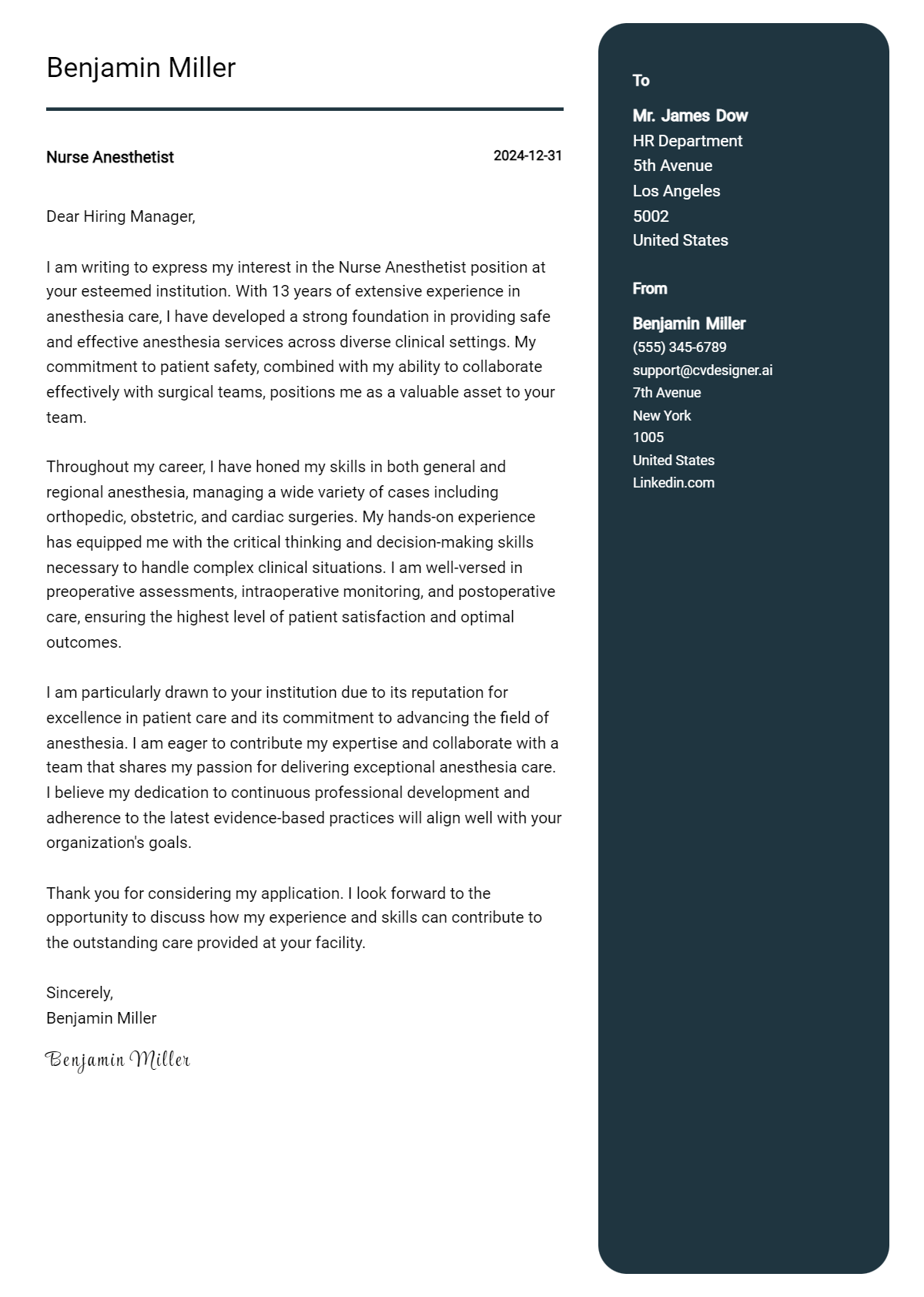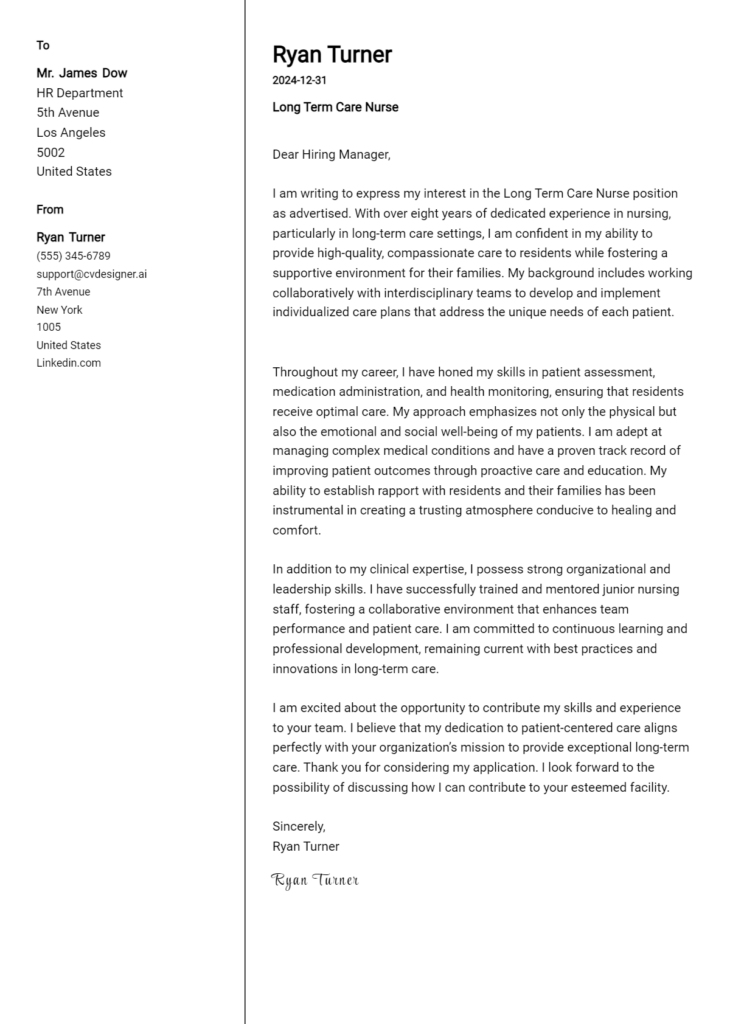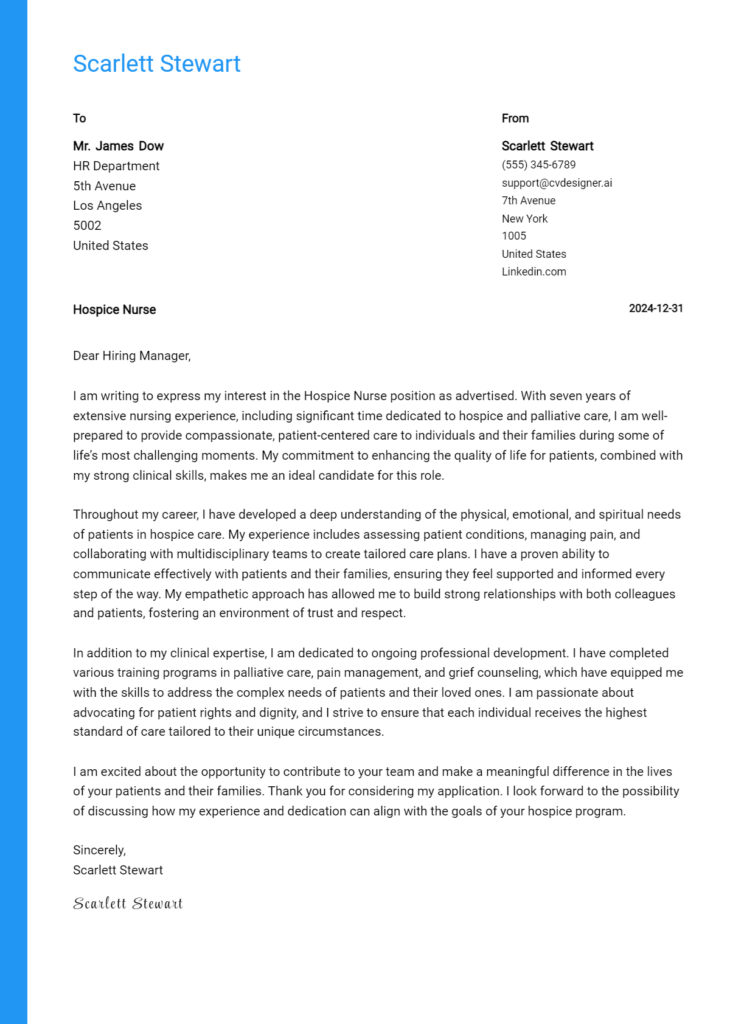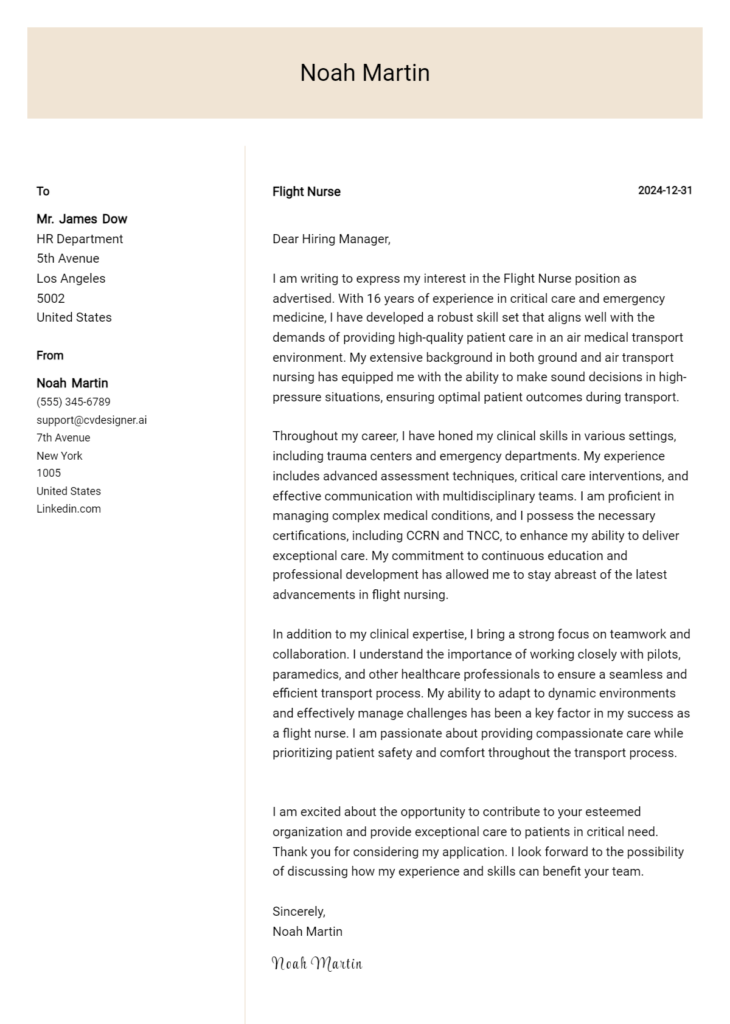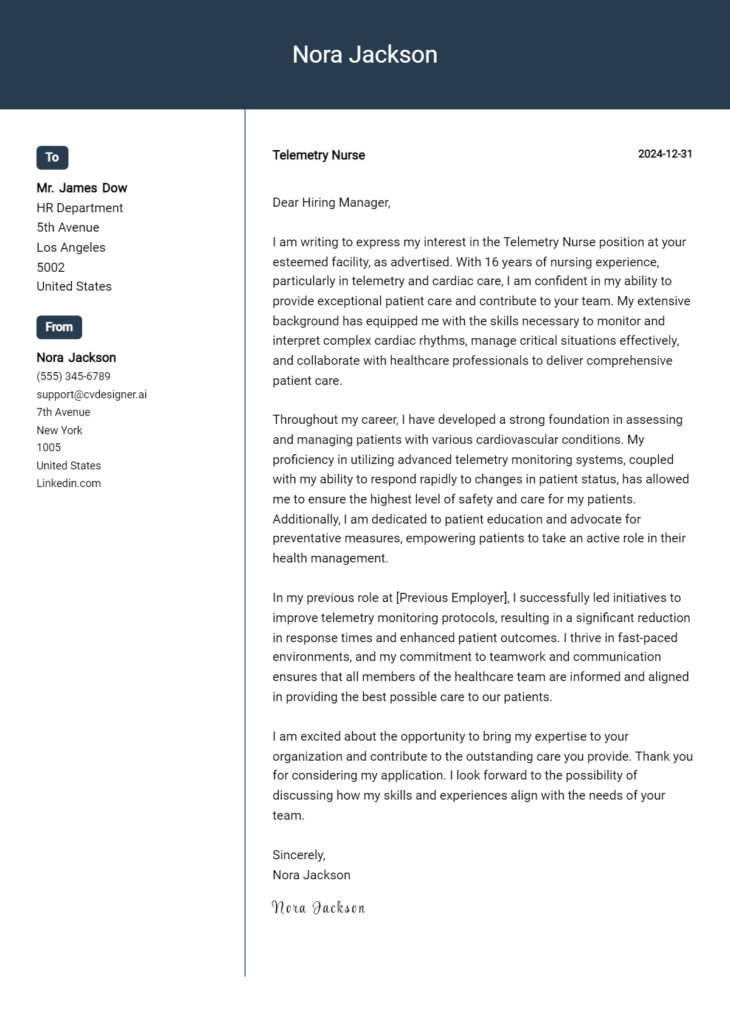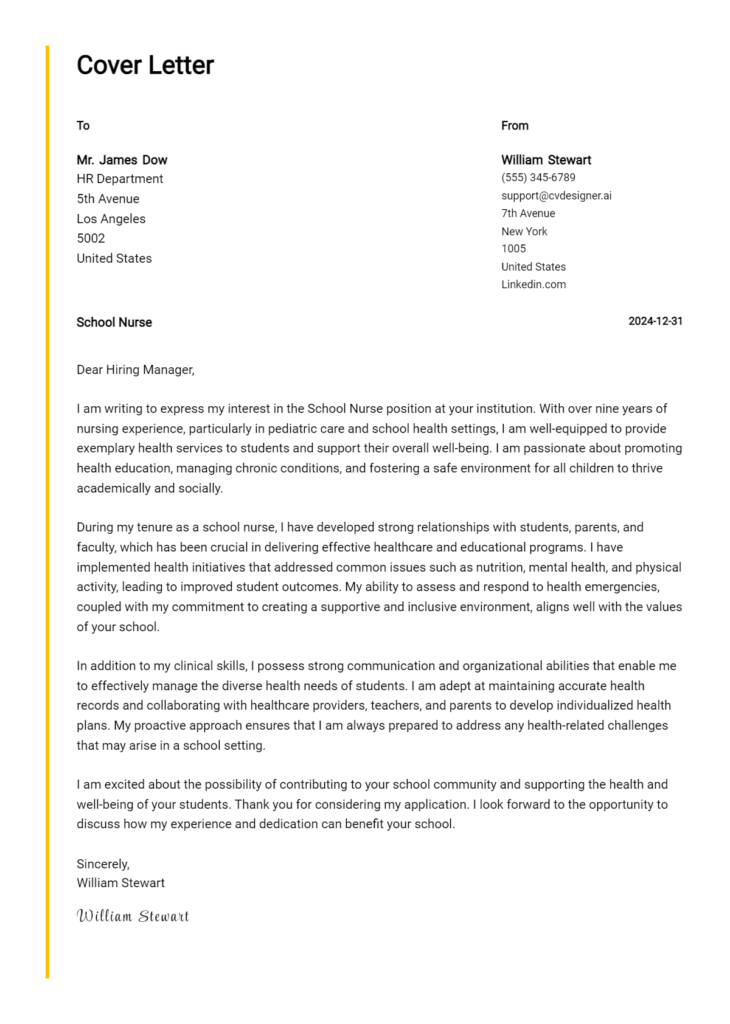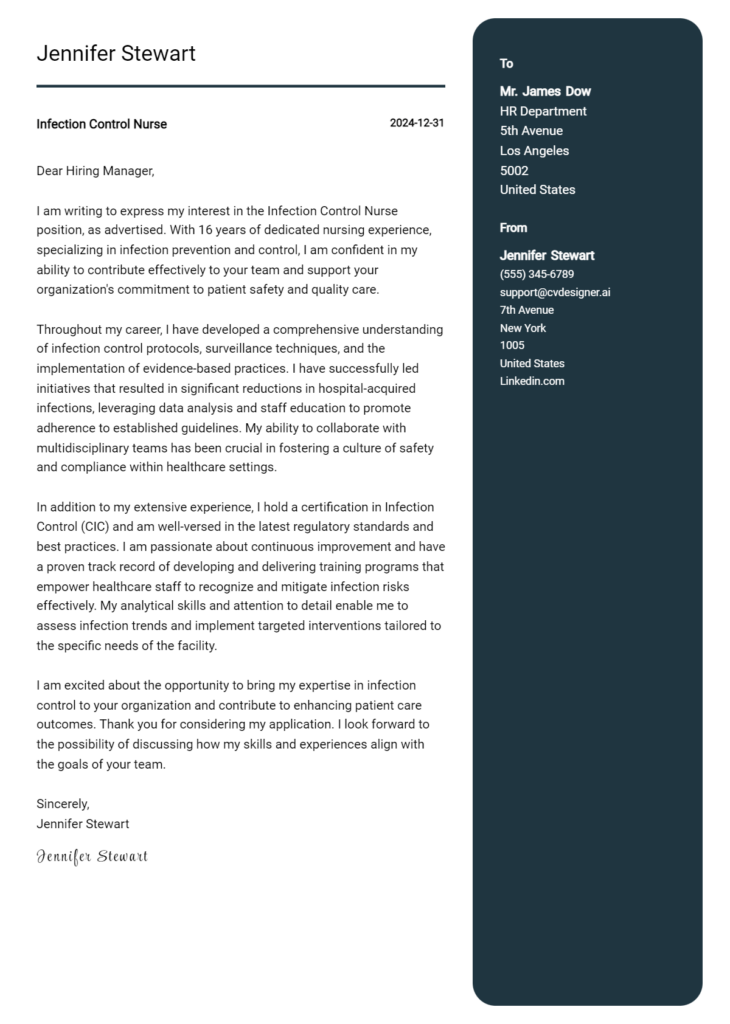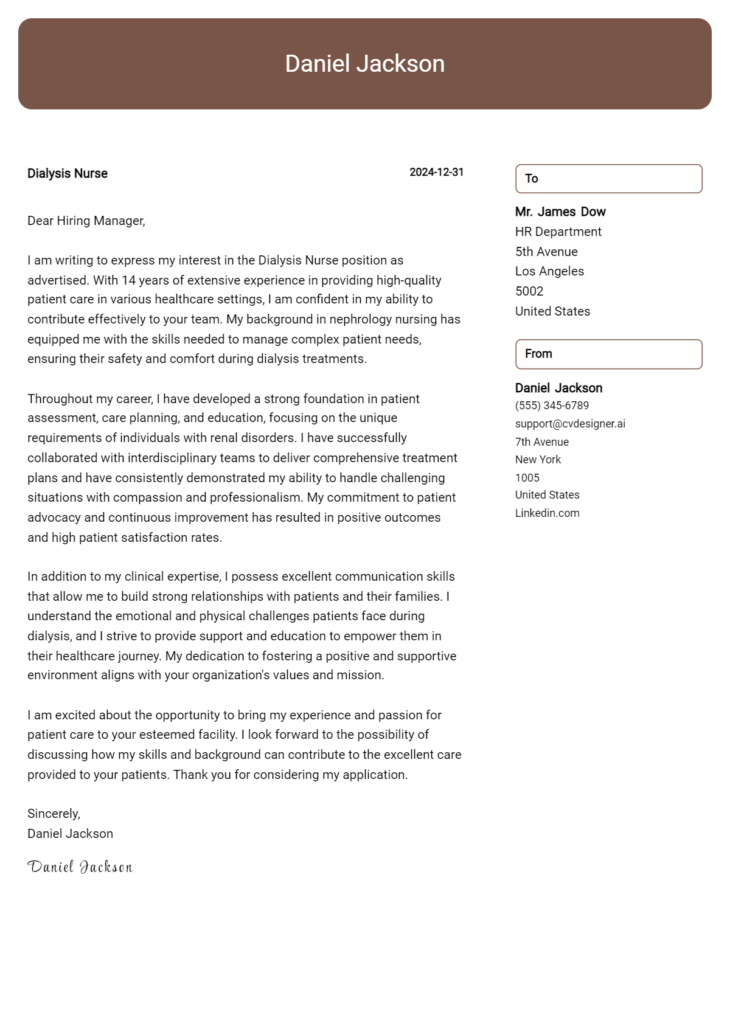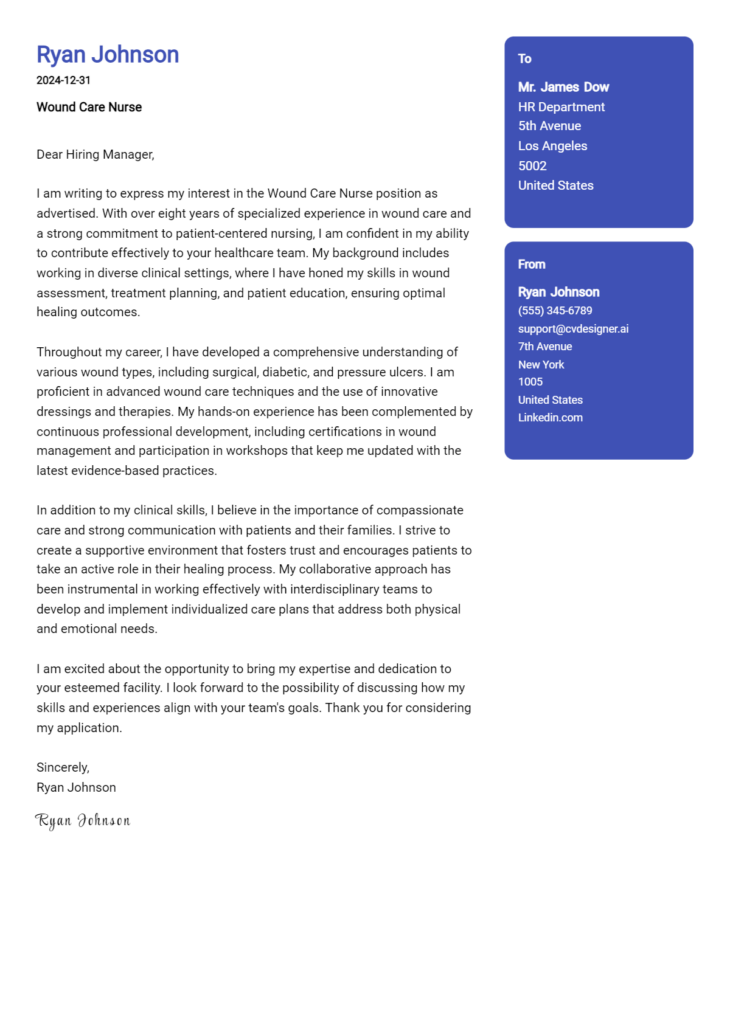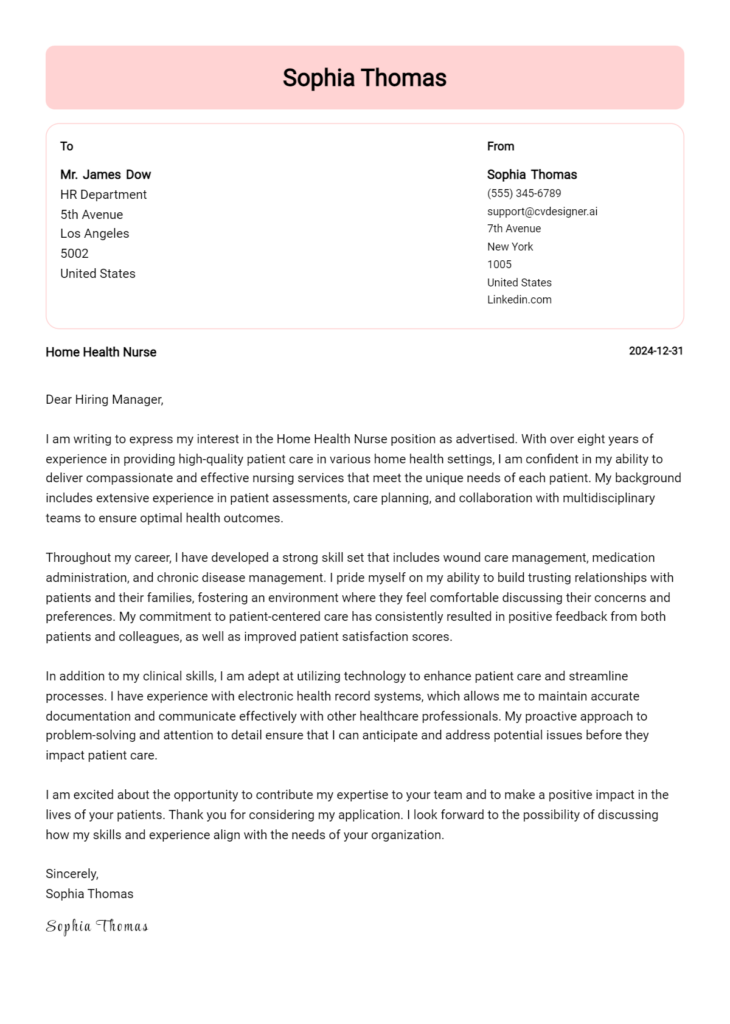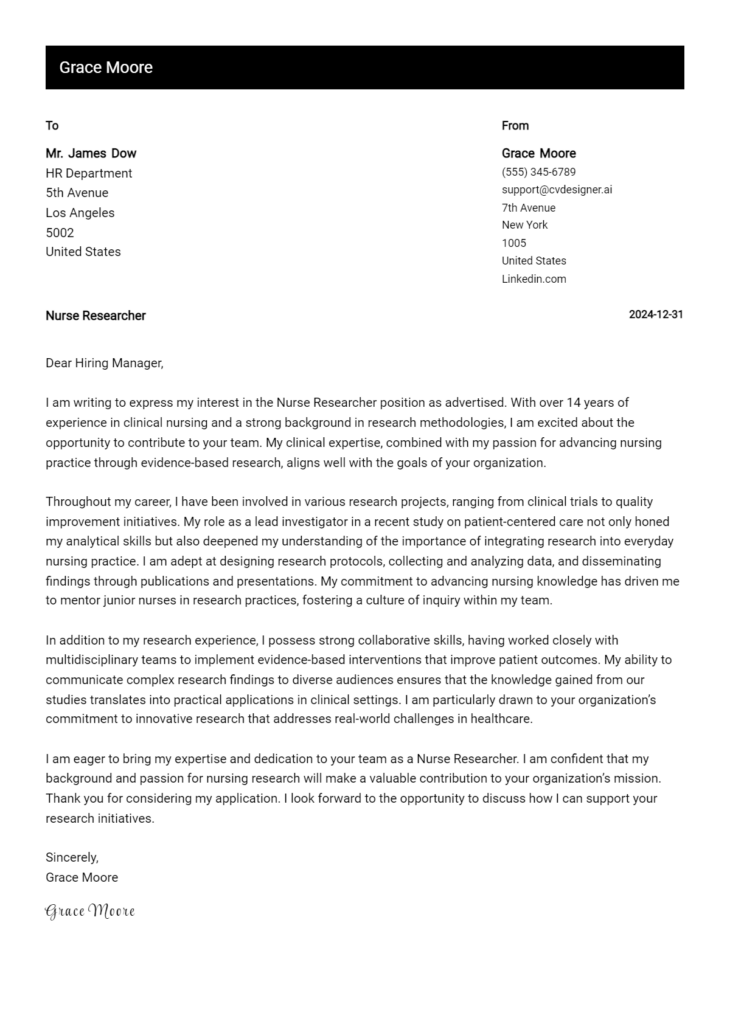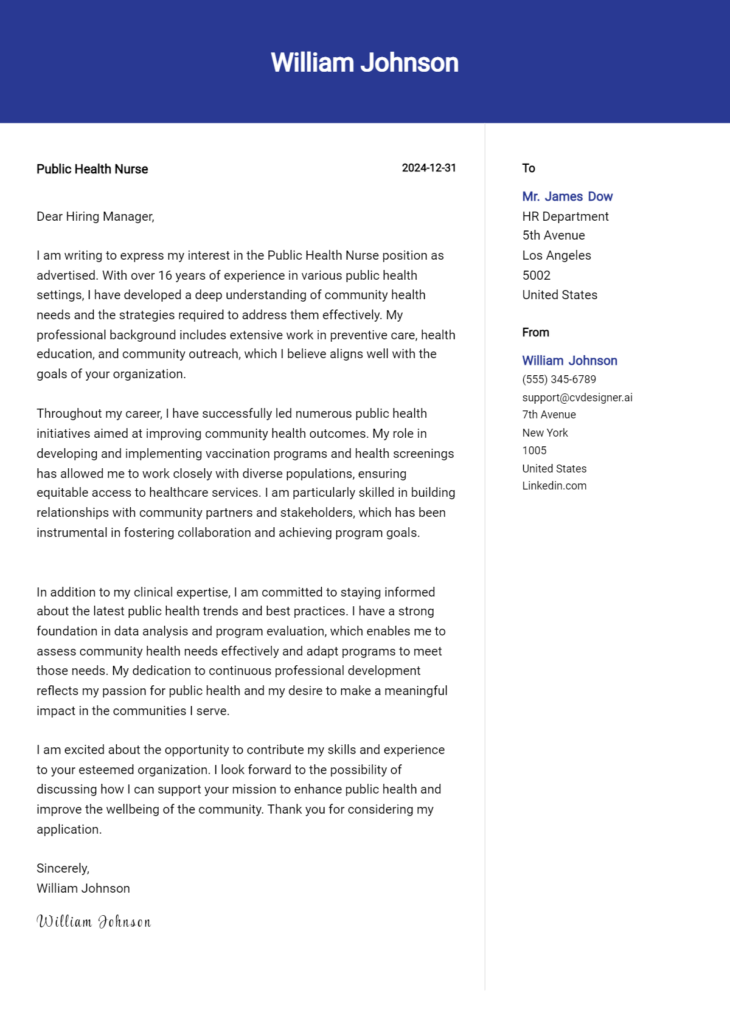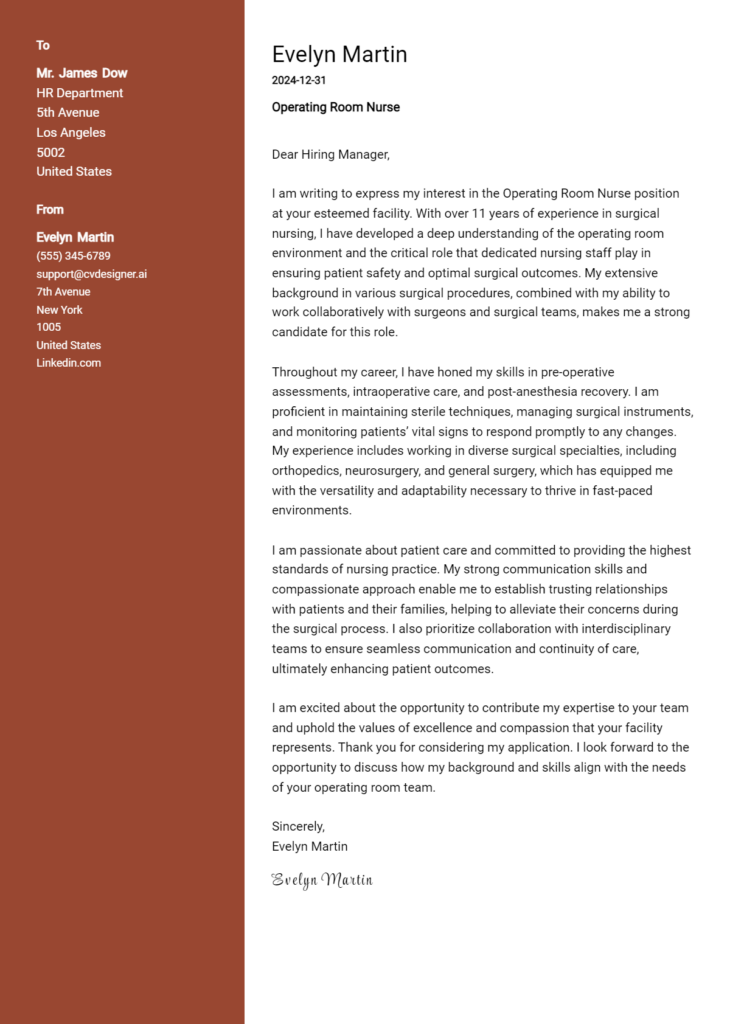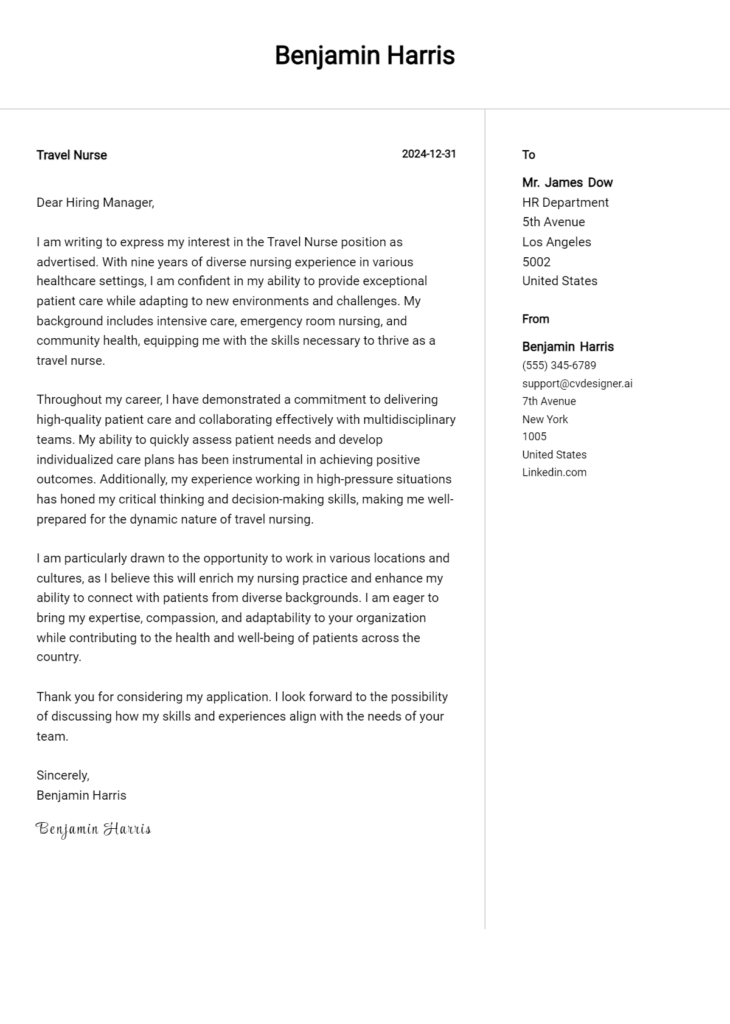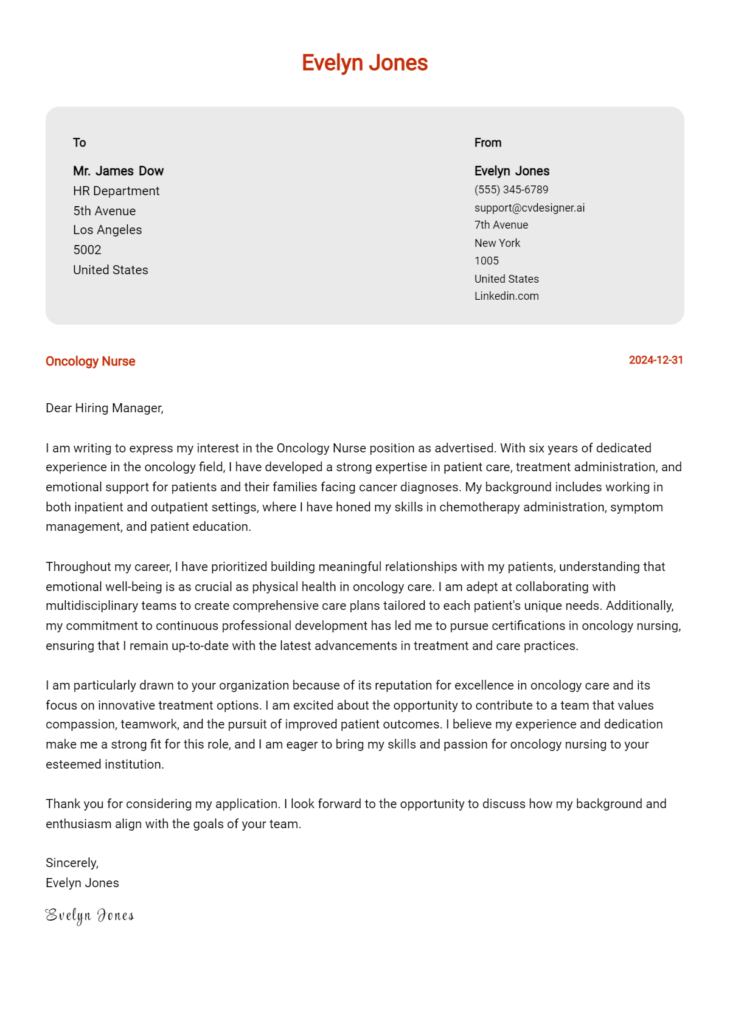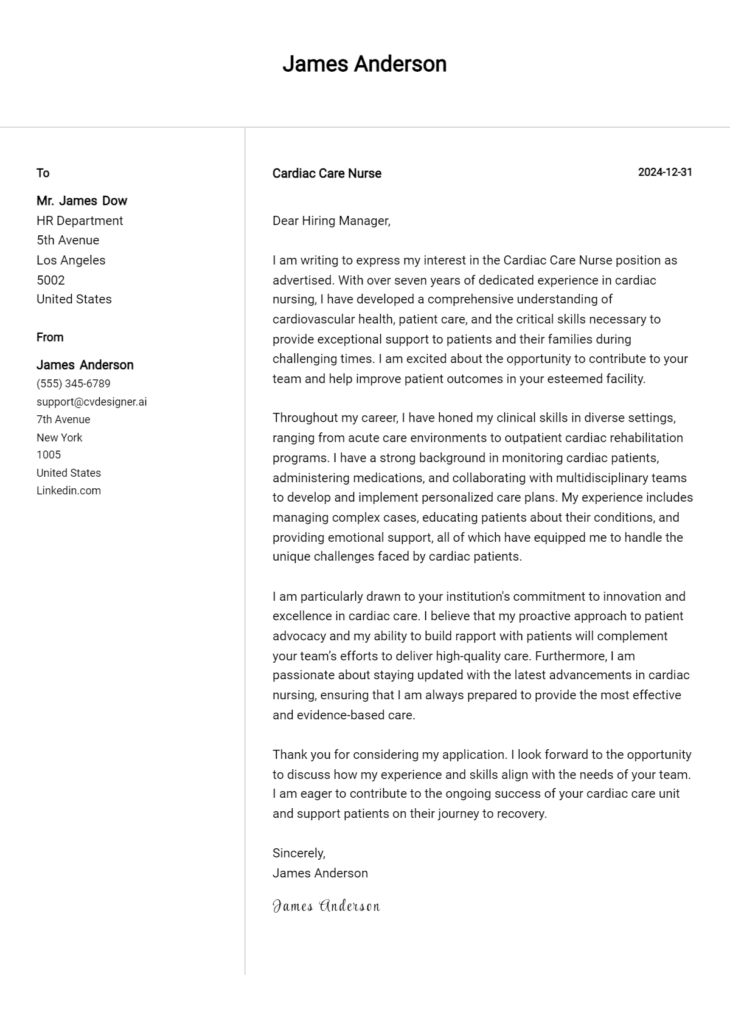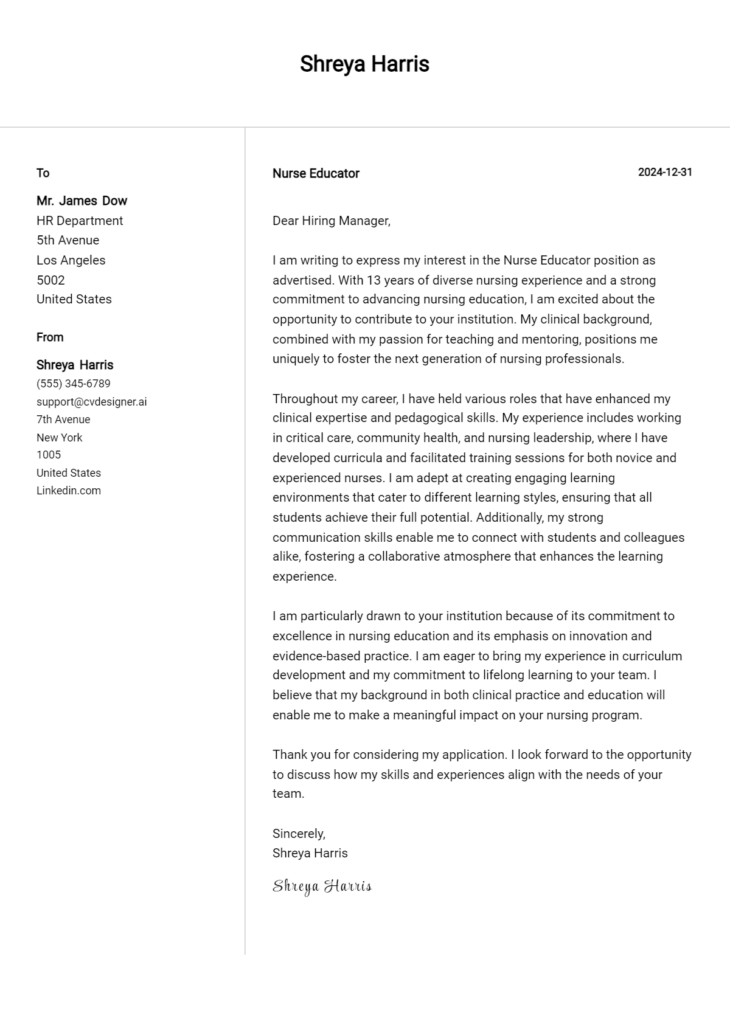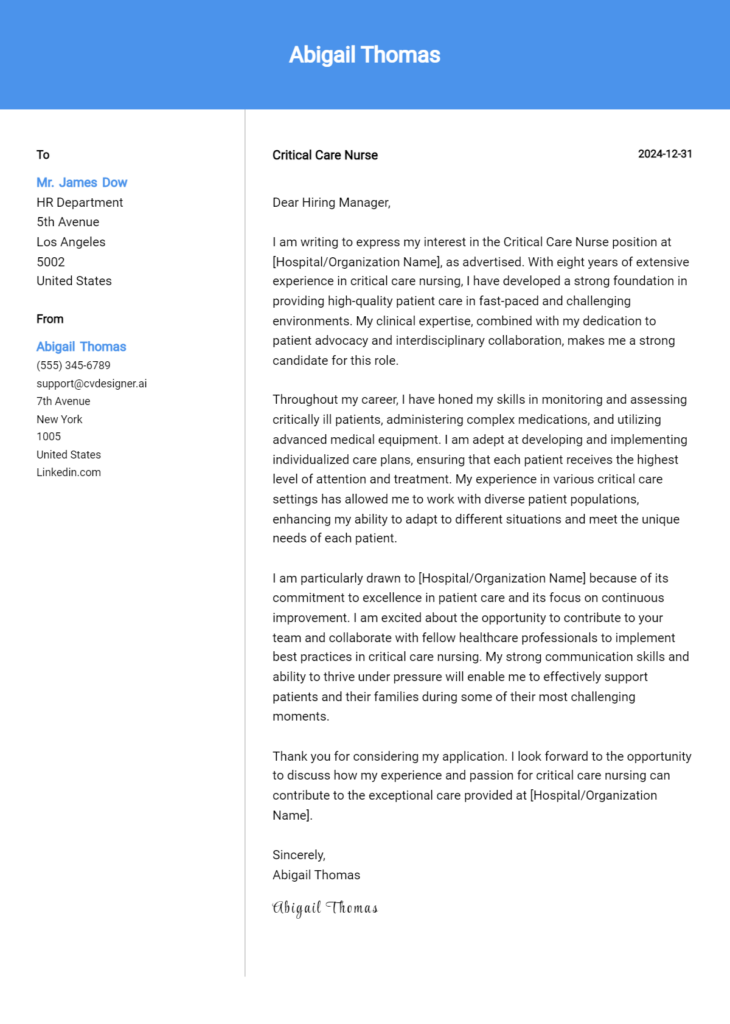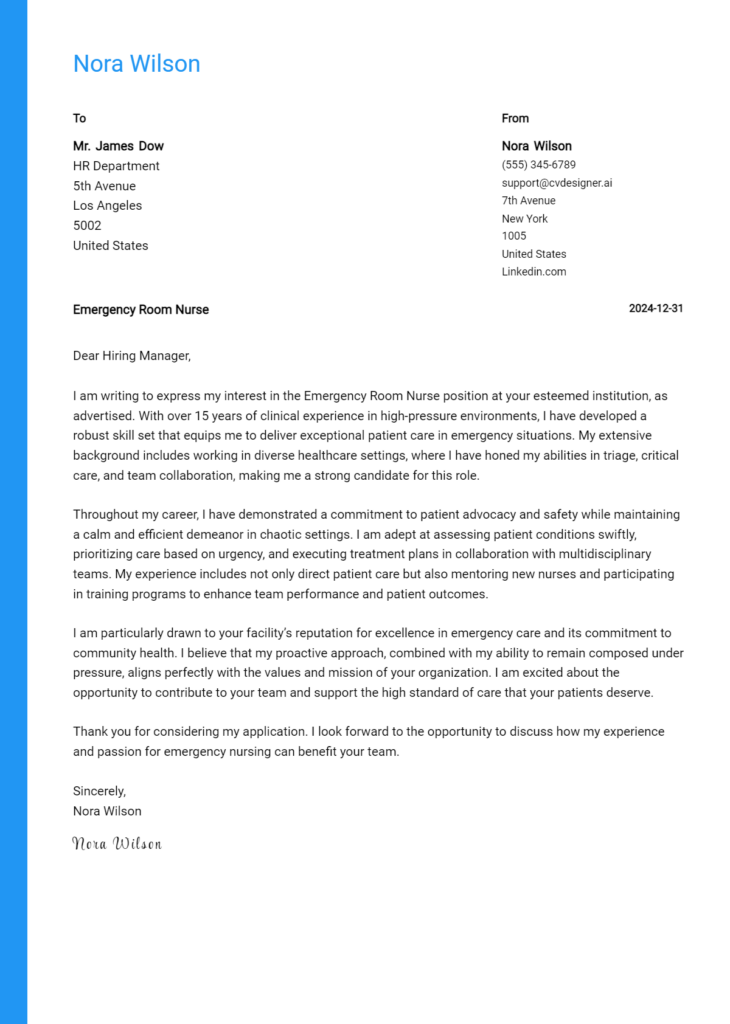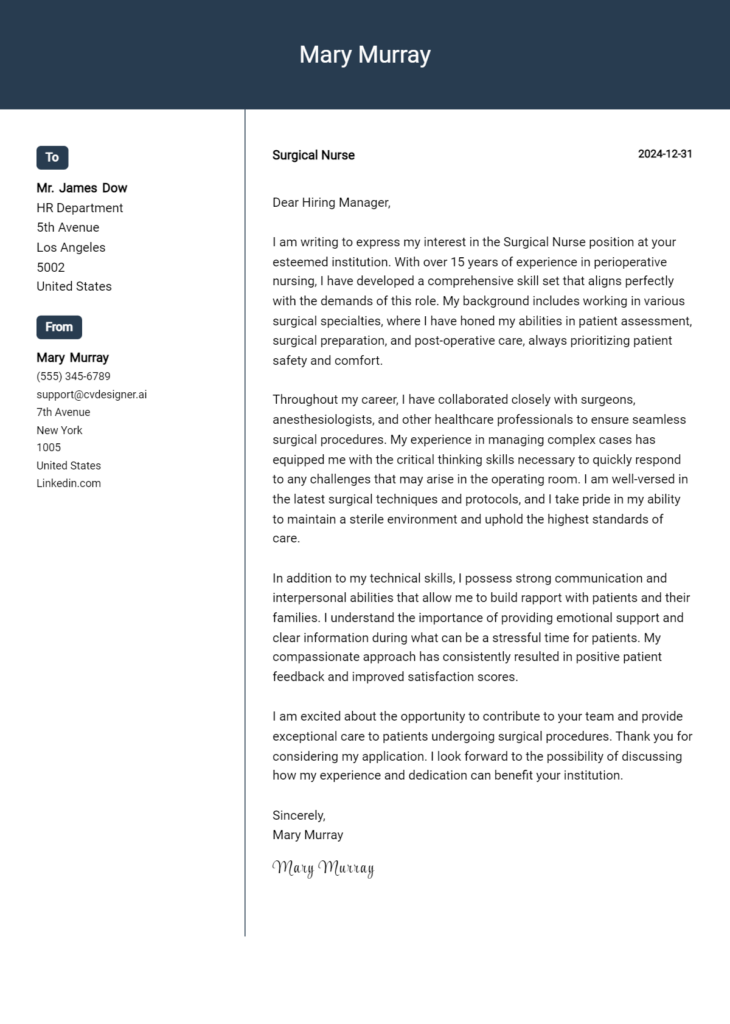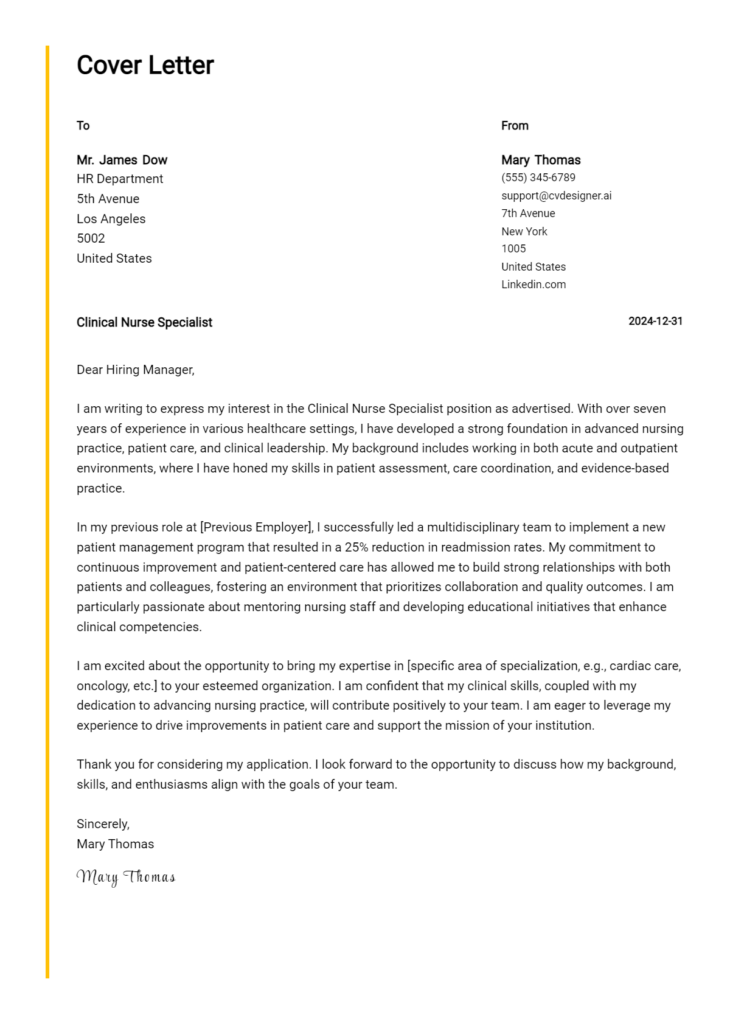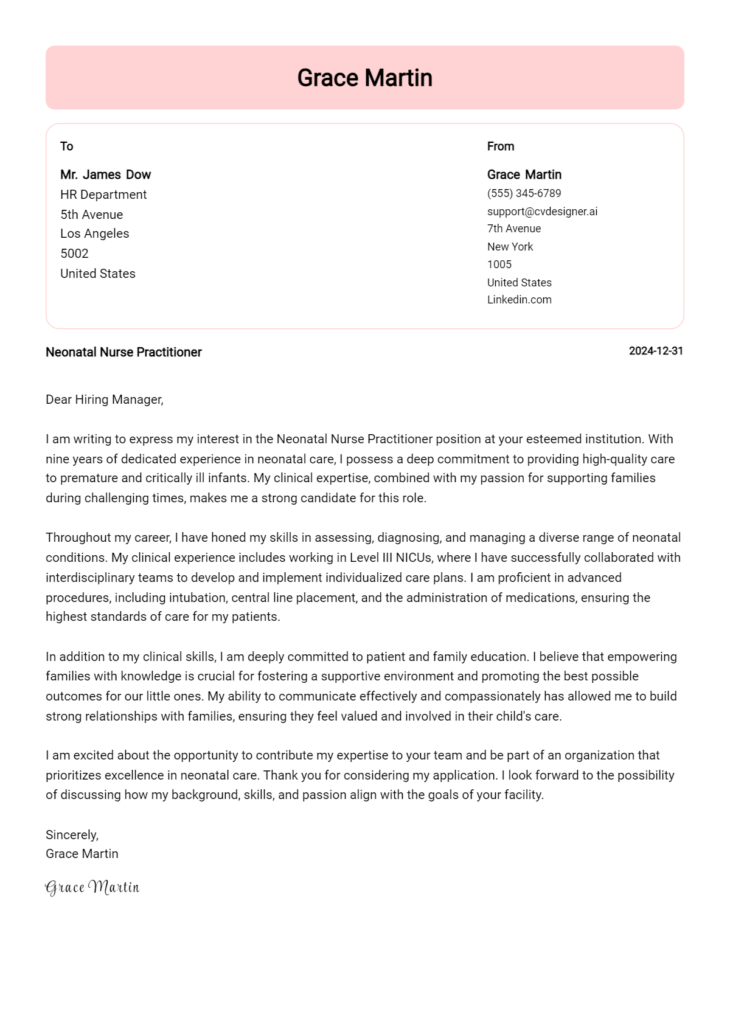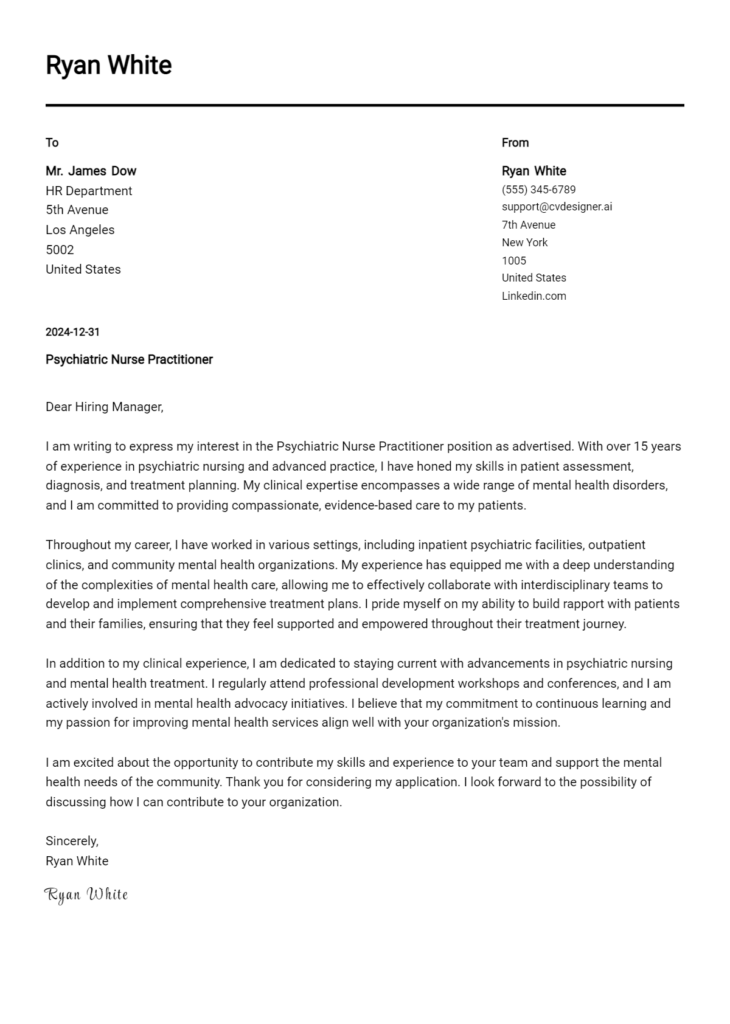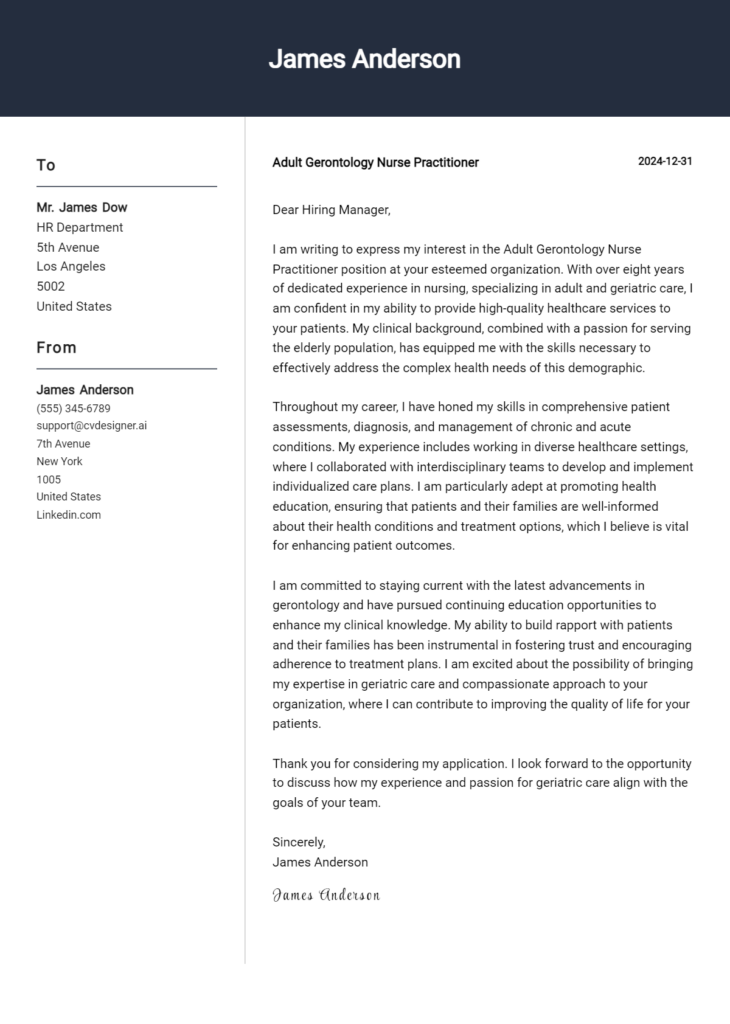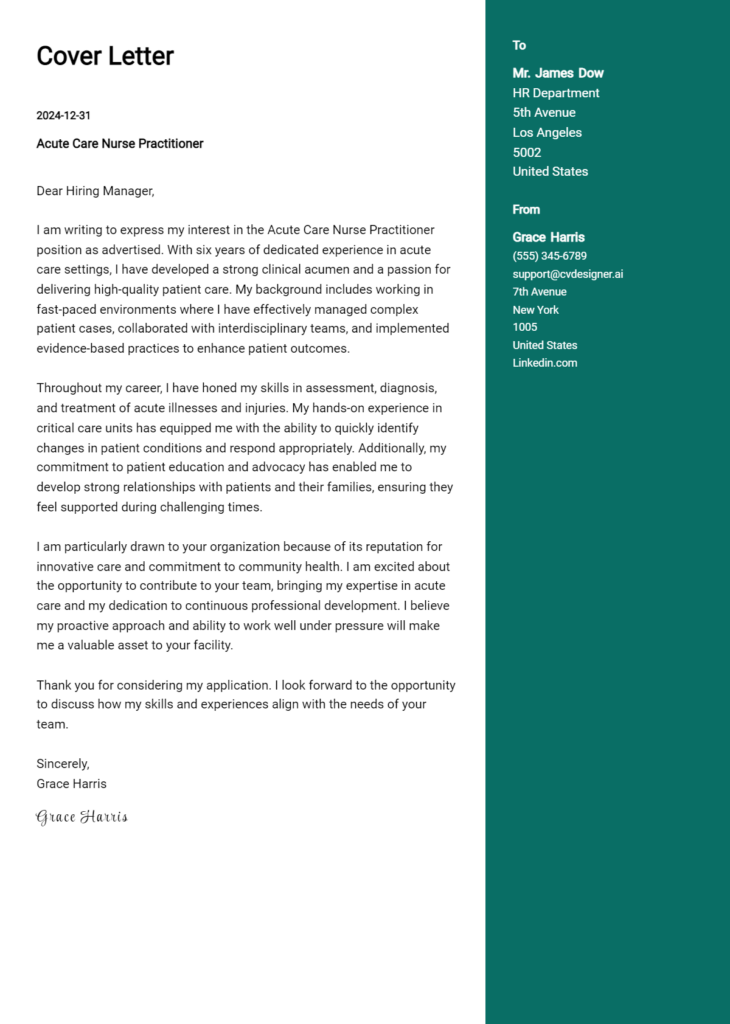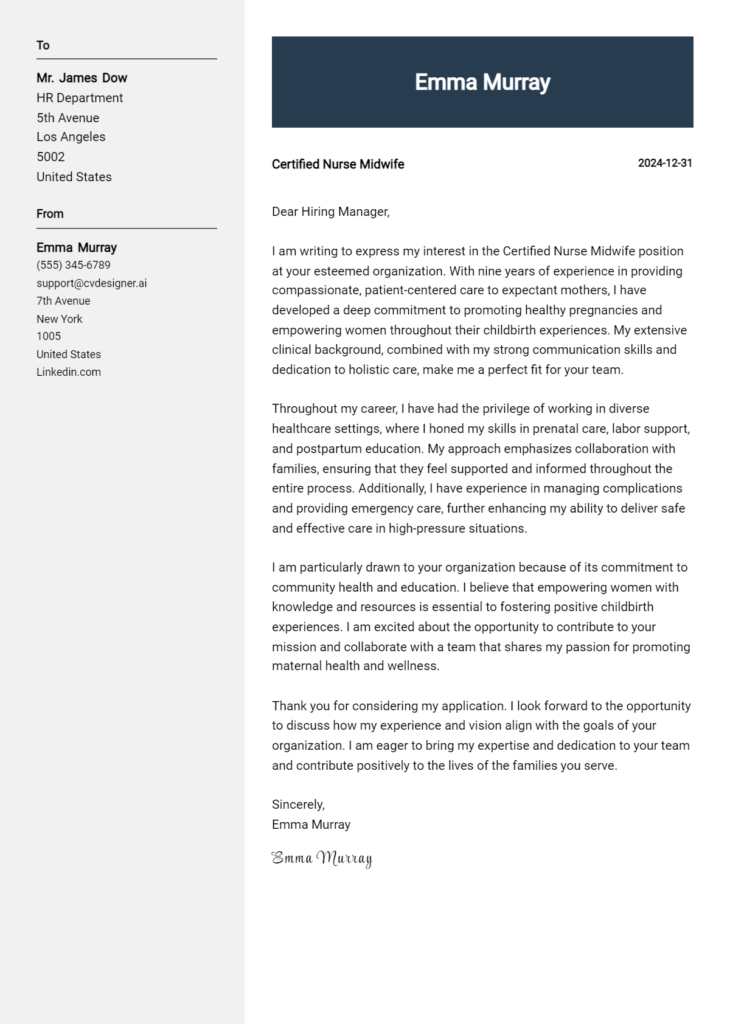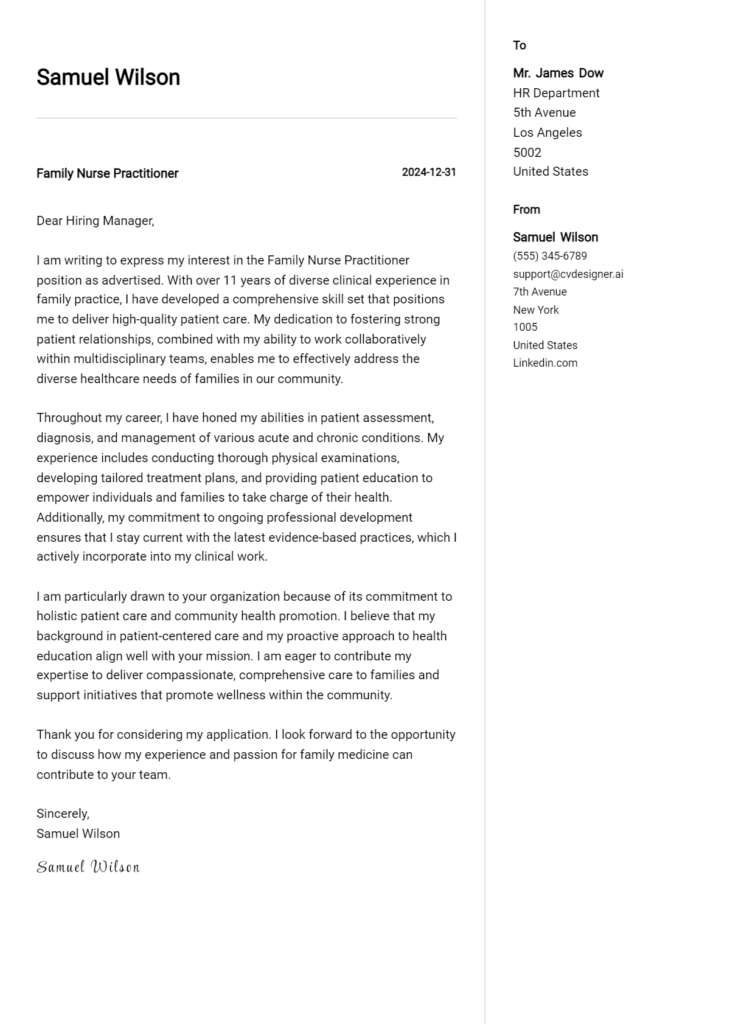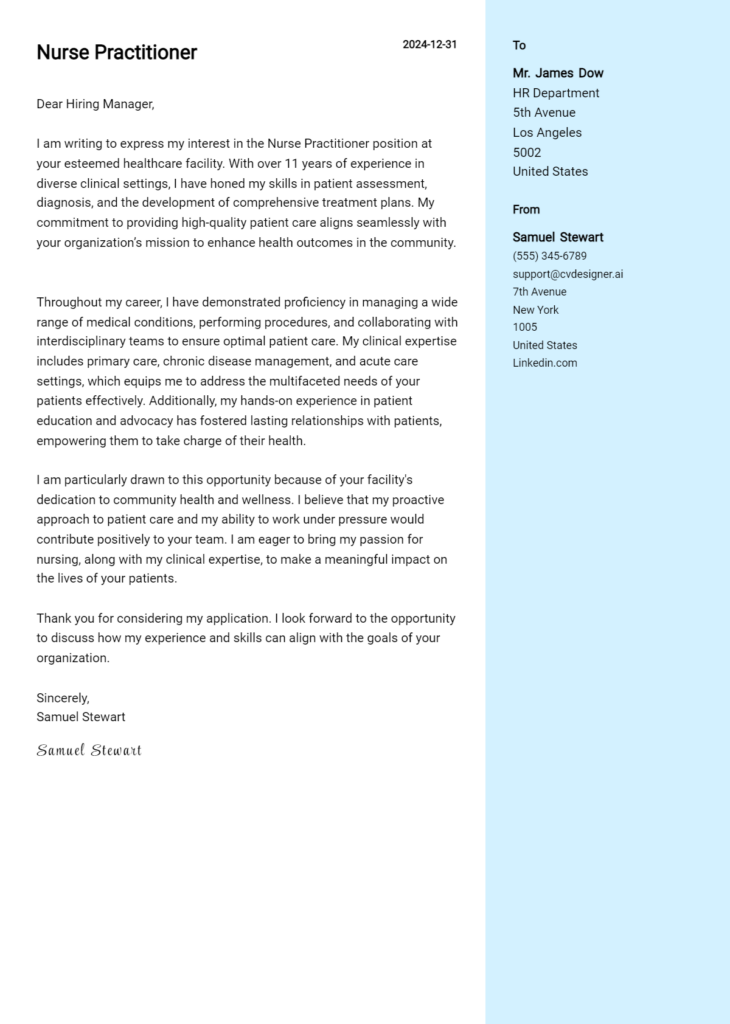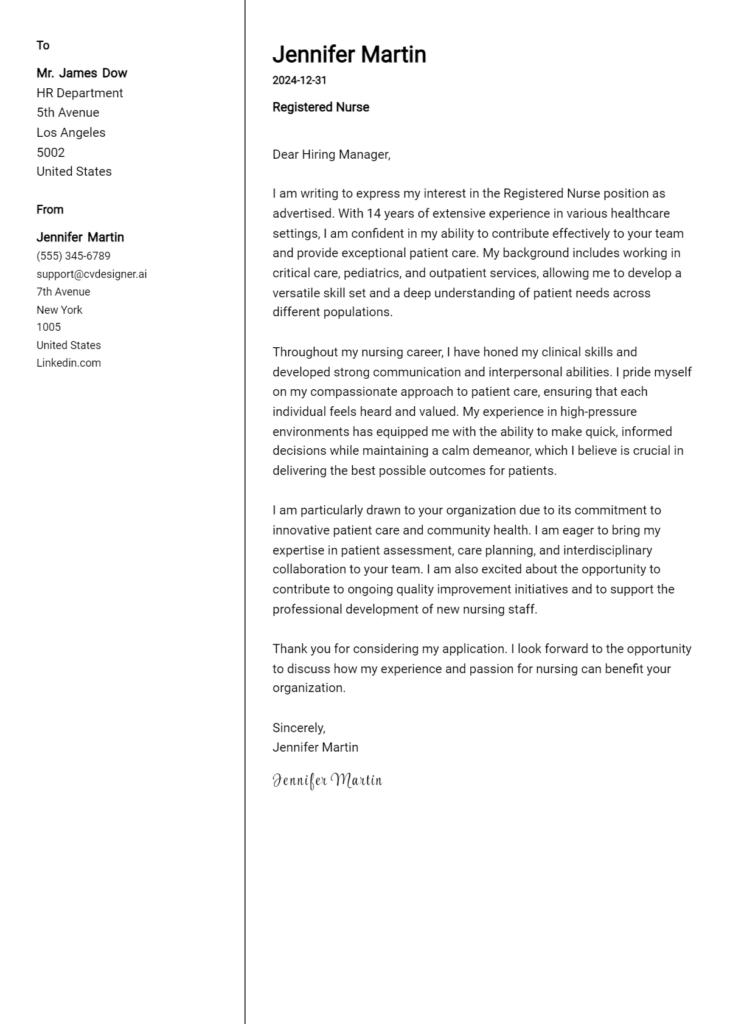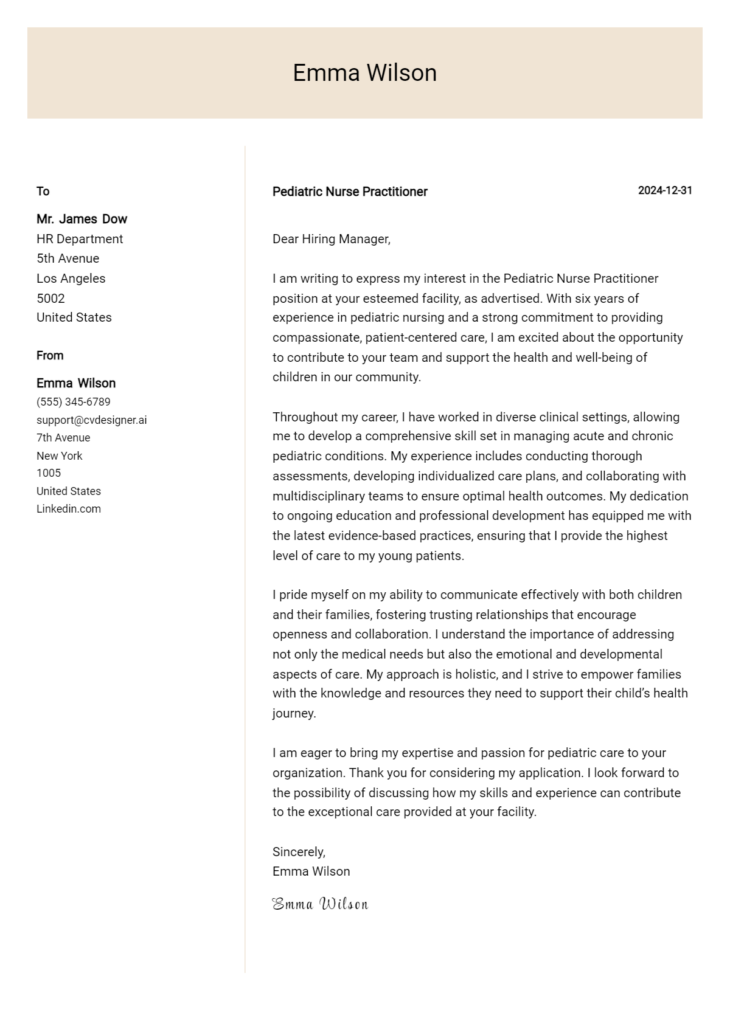Nurse Anesthetist Cover Letter Examples
Explore additional Nurse Anesthetist cover letter samples and guides and see what works for your level of experience or role.
How to Format a Nurse Anesthetist Cover Letter?
Crafting a compelling cover letter is essential for Nurse Anesthetists, as it serves as a reflection of your clinical expertise, professionalism, and ability to work under pressure. A well-structured cover letter not only showcases your qualifications but also demonstrates your attention to detail and commitment to patient safety—qualities that are indispensable in the field of anesthesia. The way you format your cover letter can make a significant difference in capturing the hiring manager's attention and conveying your suitability for the role.
In this guide, we'll outline how to structure your cover letter effectively, providing insights and nurse anesthetist-specific examples to help you create a standout document.
We'll focus on the essential components of a professional cover letter, including:
- Cover Letter Header
- Cover Letter Greeting
- Cover Letter Introduction
- Cover Letter Body
- Cover Letter Closing
Each section plays a vital role in emphasizing your qualifications and professionalism. Let’s break down each part and explain how to make your Nurse Anesthetist cover letter shine.
Importance of the Cover Letter Header for a Nurse Anesthetist
The cover letter header is a crucial component of a Nurse Anesthetist's application, as it sets the tone for professionalism and clarity right from the start. A well-structured header provides essential information, including the applicant's contact details, the date, and the recipient's information, allowing for easy communication. Clarity and professionalism in the header not only reflect the applicant's attention to detail but also ensure that the hiring manager can quickly reach out if needed.
A strong cover letter header clearly presents all relevant information in a straightforward manner, while a weak header may lack organization or omit critical details, potentially leading to confusion. Below are examples of a strong and weak cover letter header for a Nurse Anesthetist.
Strong Example
Jane Doe, CRNA 123 Anesthesia Lane Anytown, ST 12345 janedoe@email.com (123) 456-7890 October 1, 2023 Mr. John Smith Hiring Manager Anesthesia Associates 456 Medical Blvd Anytown, ST 12345
Weak Example
Jane D. Anesthesia 10/1/23 Smith
The Importance of a Cover Letter Greeting for Nurse Anesthetist
The greeting of your cover letter is crucial as it sets the tone for the rest of your application. A well-crafted greeting demonstrates professionalism and shows that you have taken the time to personalize your correspondence by addressing the hiring manager directly. This initial connection can create a positive impression, making it more likely that the reader will engage with the content that follows. To avoid generic greetings, which can come off as impersonal and lazy, it is advisable to research the name of the hiring manager, if possible. This effort reflects your enthusiasm for the role and indicates that you value the opportunity.
Strong Greeting Example
Dear Ms. Johnson,
Weak Greeting Example
To Whom It May Concern,
The Importance of a Strong Cover Letter Introduction for a Nurse Anesthetist
A well-crafted cover letter introduction is crucial for a Nurse Anesthetist, as it serves as the first impression for the hiring manager and sets the tone for the entire application. An engaging introduction should not only capture the reader's attention but also express the candidate's genuine interest in the role and briefly highlight relevant skills or noteworthy achievements. This is the opportunity to establish a connection and demonstrate why the candidate is uniquely qualified for the position. Below are examples of strong and weak cover letter introductions to illustrate the difference.
Strong Example
Dear [Hiring Manager's Name], As a dedicated and experienced Nurse Anesthetist with over five years of clinical practice in both surgical and outpatient settings, I am excited to apply for the Nurse Anesthetist position at [Hospital/Facility Name]. My passion for providing safe and effective anesthesia care, combined with my commitment to patient education and comfort, has consistently resulted in positive patient outcomes and satisfaction. I am eager to bring my expertise in regional anesthesia and my collaborative spirit to your esteemed team.
Weak Example
To Whom It May Concern, I am writing to apply for the Nurse Anesthetist position. I have worked in healthcare for a while and think I would be a good fit for your hospital. I have some experience with anesthesia, but I am looking for a new job.
Purpose of the Cover Letter Body for a Nurse Anesthetist
The body of a cover letter for a Nurse Anesthetist is crucial as it serves to effectively communicate the candidate's skills, experiences, and unique value to the hiring organization. This section allows the applicant to highlight specific projects or accomplishments that demonstrate their expertise in anesthesia care, patient management, and collaboration with surgical teams. By detailing relevant experiences, such as successful anesthesia administration in complex surgeries or involvement in quality improvement initiatives, the cover letter body can significantly strengthen the candidate's position by connecting their qualifications to the needs of the employer.
Strong Example
As a Nurse Anesthetist with over five years of experience, I have successfully managed anesthesia care for a diverse range of surgical procedures, including orthopedic surgeries and complex cardiac operations. One of my most notable achievements was leading a quality improvement project that reduced anesthesia-related complications by 20% in our facility, demonstrating my commitment to patient safety and care excellence. Additionally, I have collaborated closely with surgeons and anesthesiologists to develop individualized anesthesia plans that optimize patient outcomes, which has significantly enhanced the efficiency of our surgical services.
Weak Example
I have worked as a Nurse Anesthetist for a few years and have done anesthesia for many surgeries. I think I am a good fit for your team. I always try to do my best and help patients. I have experience, and I hope to bring that to your hospital.
Importance of the Cover Letter Closing for a Nurse Anesthetist
The closing of a cover letter is crucial for a Nurse Anesthetist as it provides an opportunity to summarize qualifications, express enthusiasm for the role, and encourage the hiring manager to take the next steps. A strong closing reinforces the applicant's suitability for the position and leaves a lasting impression that can influence the decision-maker. In contrast, a weak closing can diminish the overall impact of the letter and may lead to missed opportunities.
Strong Example
Thank you for considering my application for the Nurse Anesthetist position at [Hospital Name]. With over five years of experience in anesthesia administration and a commitment to patient safety, I am eager to contribute my expertise to your team. I am truly passionate about providing high-quality care and would appreciate the opportunity to discuss how my background aligns with the needs of your department. I look forward to the possibility of an interview and hope to provide further insights into how I can support your mission.
Weak Example
Thanks for reading my letter. I think I would be okay for the Nurse Anesthetist job. If you want, you can check my resume. I hope to hear from you soon, but no pressure.
Crafting an effective cover letter for a Nurse Anesthetist position is crucial to making a strong impression on potential employers. Your cover letter should not only highlight your technical skills and problem-solving abilities but also demonstrate your knowledge of the Software Development Life Cycle (SDLC), your ability to work within a team, and your passion for continuous learning. These elements are essential in showcasing your qualifications and fit for the role. Here are some tips to help you write a compelling cover letter:
Tips for Writing an Effective Nurse Anesthetist Cover Letter
Highlight Technical Skills: Clearly outline your technical skills related to anesthesia practices, monitoring, and patient care. Use specific examples to demonstrate your proficiency with anesthesia equipment and techniques. This not only shows your expertise but also your readiness to handle the responsibilities of the role.
Showcase Problem-Solving Abilities: Provide examples of how you have effectively addressed challenges in previous roles. Describe situations where you had to make quick decisions under pressure, showcasing your critical thinking and problem-solving skills. This is particularly important in the high-stakes environment of anesthesiology.
Mention SDLC Knowledge: If applicable, discuss your understanding of the Software Development Life Cycle and how it impacts patient care technology in anesthesiology. This knowledge illustrates your ability to integrate technology into clinical practice and your commitment to staying current with advancements in the field.
Emphasize Teamwork: Nurse Anesthetists often work closely with surgeons, nurses, and other healthcare professionals. Illustrate your ability to collaborate effectively within a multidisciplinary team by providing examples of successful teamwork in past experiences. Highlight how your contributions have led to improved patient outcomes.
Express a Passion for Continuous Learning: The medical field is constantly evolving, and a commitment to lifelong learning is essential. Mention any relevant certifications, training, or continuing education courses you have pursued. This demonstrates your dedication to professional growth and your desire to provide the best care possible.
For more guidance, consider utilizing cover letter templates to structure your letter or try a cover letter builder for a more personalized approach. These resources can help you create a polished and effective cover letter that stands out to employers.
Common Mistakes to Avoid in a Nurse Anesthetist Cover Letter
Crafting a compelling cover letter is essential for standing out in the competitive field of nurse anesthetists. Avoiding common mistakes can significantly enhance your chances of making a positive impression on hiring managers. Here are some pitfalls to watch out for:
- Generic Greetings: Using "To Whom It May Concern" can make your letter feel impersonal. Research and address the letter to a specific person to establish a connection.
- Repetition of the Resume: Simply restating your resume can bore the reader. Instead, highlight specific experiences or achievements that demonstrate your fit for the role.
- Lack of Personalization: Failing to tailor your cover letter to the specific job or institution can make it seem like a mass-produced document. Reference the job description and the organization’s values to show genuine interest.
- Ignoring Formatting Guidelines: Neglecting proper cover letter format can lead to a disorganized appearance. Consult a cover letter format guide to ensure clarity and professionalism.
- Spelling and Grammar Errors: Typos and grammatical mistakes can detract from your professionalism. Always proofread your letter multiple times or use a grammar-check tool.
- Overly Casual Language: Maintaining a professional tone is critical. Avoid slang or overly casual expressions that may undermine your credibility.
- Failing to Showcase Relevant Skills: Not effectively communicating your anesthesia-related skills can leave hiring managers unconvinced. Use specific examples to demonstrate your expertise and how it aligns with the position.
By steering clear of these common mistakes, you can create an impactful cover letter that showcases your qualifications effectively. For inspiration, consider exploring cover letter examples that resonate with your professional style.
Cover Letter FAQs for Nurse Anesthetist
What should I include in my cover letter as a Nurse Anesthetist?
As a Nurse Anesthetist, your cover letter should highlight your clinical skills, experiences, and certifications relevant to anesthesia practice. Start with a strong introduction that states the position you’re applying for and your enthusiasm for the role. Discuss your educational background, including your Master’s degree in Nurse Anesthesia and any specialized training. Emphasize your hands-on experience in various clinical settings, showcasing specific cases where you effectively managed anesthesia care. Additionally, mention your certifications such as the National Certification Examination (NCE) for Nurse Anesthetists, as well as any continuing education or professional memberships. Conclude with a clear statement of your desire to contribute to the organization and an invitation for further discussion.
How can I effectively showcase my skills in a cover letter?
To effectively showcase your skills in your cover letter, use specific examples to illustrate your expertise in anesthesia. Instead of merely listing skills, describe scenarios where you utilized them effectively. For instance, discuss your proficiency in administering anesthesia for different surgical procedures, highlighting your ability to adapt to varying patient needs. Mention your skills in monitoring patient vitals and managing anesthesia complications, and how these contributed to positive surgical outcomes. Be sure to also include your interpersonal skills, such as communication with surgical teams and patient education, which are crucial for building trust and ensuring patient safety. Tailoring these examples to the specific job description can further enhance your cover letter’s impact.
Should I customize my cover letter for each job application?
Yes, it is essential to customize your cover letter for each job application. Tailoring your cover letter shows potential employers that you have taken the time to understand their organization and the specific requirements of the position. Start by researching the healthcare facility, its values, and any recent achievements, and reflect this understanding in your letter. Use keywords from the job description to align your qualifications with the employer's needs, addressing how your background uniquely qualifies you for the role. Additionally, mention any shared values or objectives that resonate with you. A customized cover letter not only highlights your relevant skills but also demonstrates your genuine interest in the position and the organization.
What tone should I use in my cover letter?
The tone of your cover letter should be professional yet personable. As a Nurse Anesthetist, it's crucial to convey your expertise and confidence in your abilities while also being approachable. Start with a respectful greeting and maintain a formal structure throughout your letter. Use clear and concise language that reflects your professionalism, avoiding overly technical jargon unless necessary. While the tone should be serious, infusing some warmth and passion for your work can make your cover letter stand out. Show your enthusiasm for providing quality patient care and your commitment to the anesthesia profession. Striking the right balance between professionalism and personality can leave a positive impression on hiring managers.
Build your Cover Letter in minutes
Use an AI-powered cover letter builder and have your letter done in 5 minutes. Just select your template and our software will guide you through the process.

